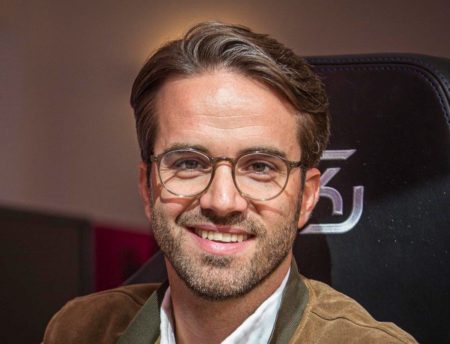
In this interview about Digital Transformation at FC Köln we feature Philipp Liesenfeld, Head of Corporate Development & Esports at FC Köln, who is responsible for all the digital transformation, corporate development, innovation & esports, as part of his strategic portfolio of activities at the German club.
Read on to learn why and how FC Köln embarked on its digital transformation process, what challenges the German club faced throughout the process, how they approached the COVID-19 lockdown, and why the club decided to enter the esports industry.
1. Why did FC Köln embark on a digital transformation process?
Up until the end of 2016, our business model was well developed, and from a financial standpoint, it was a sustainable business model. Starting around that time, we recognized that our business model had some gaps if it were to be sustainable in the fast-changing digital era. So, beginning in 2017 we decided to embark on a digital transformation process, that would allow us to plan, develop, scale and monetize new digital assets.
2. Can you explain what steps you followed in order to set up the digital strategy at FC Köln?
The first thing we did was show proof of why digital transformation was key for our growth. To mobilize resources, budget, people, partners, you must be in a position to present a solid business case for digital transformation. This led us to create a holistic digital strategy that was multi-year and showed what steps needed to be taken. Once the strategy was defined, we set up clear KPI’s on how digital could leverage the existing business model. Part of this digital transformation process depended on the involvement of our employees and later on, our fans. Internally, we conducted an employee survey to understand their main pain points, and then we reconciled their feedback with the feedback we received from the fans. With the fans specifically, we tried to understand from them what they were expecting from the club from a digital perspective. After compiling all this feedback, we decided to focus on three strategic pillars: innovation, ecommerce, and esports. Once the strategic pillars were defined, we identified key projects that would help us take the next steps towards reaching the different goals.
3. What has the biggest challenge been during the digital transformation process?
After compiling and analyzing the feedback from the employees and from the fans, we saw there were a lot of good ideas. Our main challenge was that we did not have the right operational, technical or personal infrastructure to execute most of them. Based on this, we focused on corporate development to make sure we, as an organization, foster the right innovation culture. We also realized that we had to upgrade our digital and technological stack quite significantly. Having the right people and the right tools definitely was, and remains, our number one priority to be able to execute the strategy. This allows us to bring most of the implementation in-house, which gives us greater flexibility, higher creativity, and a more efficient budget process for digital transformation. In my opinion, the key success factor for a digital business in this era is to be able to be agile and fast in responding to validated feedback loops with customers; in our case, that’s fans, athletes, and our commercial partners.
4. Thanks to having a solid digital foundation in place, FC Köln was able to stay in contact with its stakeholders, sponsors, partners and fans during the COVID-19 lockdown. Can you tell us more about it?
For us, anticipating the future, starting our digital process some time ago, and having a solid digital foundation in place has played a key role in providing great value to our ecosystem during the lockdown.
From an internal standpoint, having developed a digital-based culture within our organization has helped us adapt to remote working very fast.
From a sponsorship point of view, having different digital rights in place helped us a lot. We shifted the TV rights towards digital rights and compensated that to our sponsors.
From the fan point of view, our esports department began streaming esports tournaments on our dedicated Twitch and Youtube channels. Our fans were able to play against our players, and it was a great way to keep the link to the club alive and to provide value to our fans in a period that was difficult for many people in society.
Again, the digital foundation and the corporate culture we cultivated in the last years, allowed us to adapt very quickly to the fallout from COVID-19. This resilience is now in our DNA which makes us even more prepared to deal with future challenges as an organization.
5. How did you identify entering esports as an opportunity? What was the decision-making process behind that and what are you hoping to achieve by working in this space at FC Köln?
When we defined our digital strategy, esports was one of the key pillars. One of the key aspects we considered with our digital strategy was to create a novel way for our club to interact with the younger generation. And based on how young people are consuming content, and how esports is gaining share in the attention economy, we realized that it would provide a link between our club, its values, our partners, and the old and new fans.
Once we decided to enter the esports industry, we first wanted to learn from the industry, and build experience in it over time. This is very important in esports, because as an industry there are many different ways to be in it, so experimentation and iteration were important for us. Concretely, our entry looked like this. In 2017, we signed a strategic partnership with SK Gaming to accelerate our understanding and to be with a credible and knowledgeable partner. It quickly became clear that there were many opportunities for cross-pollination between the club and SK Gaming, so a year after signing the partnership, we invested in the company. This made us serious players in the industry and signalled our intentions to the esports industry but also to the football industry and our partners.
Our learnings from the esports industry early on were that the community was passionate about their genre, games, teams, events and players. If we were going to build the right brand for FC Koln in esports, we needed to pay attention to elements such as credibility, and a long-term view. We definitely see it as a growth area, and the esports sector itself is going through many changes, presenting many new opportunities, so this approach of ours with a strong partner, and a credible long-term view, gives us a stronger chance to ultimately engage these younger audiences. Eventually, our aim is to cross-pollinate the esports and football offering so that we are creating distinct and interrelated brand offerings on the football and esports sides.
6. As the last question, how important is it for football clubs to perform an internal digital assessment and develop a strategy before disembarking on their digital transformation journey?
As in other businesses across different industries the strategy is key to have an aligned picture where the organization wants to develop within the next few years. Especially when it comes to a digital strategy it needs to be clear that you have a common understanding of why digital development is essential for sustainable growth.
The strategy is the base you need to make sure that the actions you take are clear and attached to every project in the organization. If you do not integrate it in your corporate strategy it will always be something aside and you will not be able to generate digital business, which will be needed in the future.



